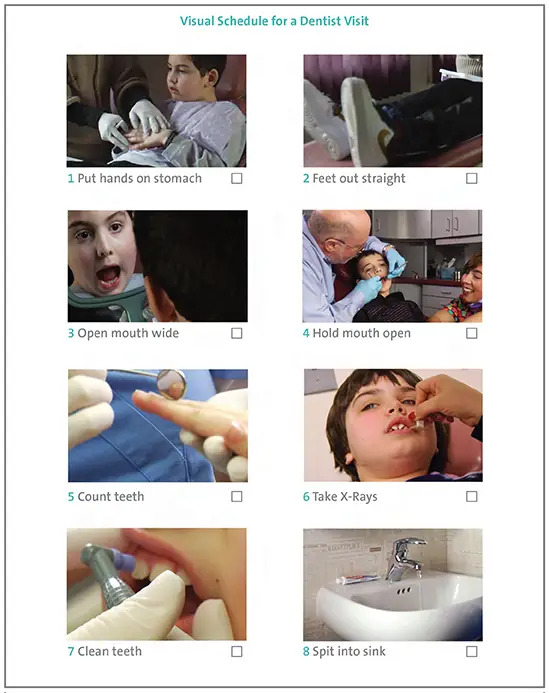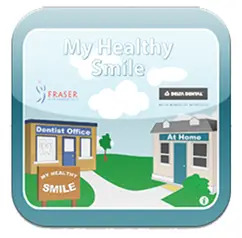Local experts share ways you can help your child face their fears and tame their anxiety about visiting the dentist, plus how to help a dental visit go smoothly for a child with special needs.
 |
Autism Speaks partnered with Colgate and Philips Sonicare to create a dental guide for parents of children with autism. The booklet includes information about how to prepare for a dental visit, forms to use for your visit, and this visual schedule of a dental appointment; it is helpful for children with varying developmental disabilities, not just autism. Download the full guide at autismspeaks.org/dental-tool-kit. |
So many kids are afraid of going to the dentist for the first time. “We work in an anxiety-provoking setting,” observes Jennifer Epstein, D.M.D., of Kids First Pediatric Dentistry & Orthodontics in Fairfield, CT. To help kids deal, communicate proactively with your child’s dentist. “We want a heads-up about your child’s sensitivities,” Dr. Epstein says. “It could be sounds, smells, visuals, or maybe they can’t stay in the room. The position [for an exam] can be anything. I’ve done exams standing, sitting in my chair, laying down in the chair—almost every way you can think of. We do a lot of lap exams. I also need to know what I can do within the limits of what the parents are comfortable with. We also employ ‘tell, show, do,’ in which we tell the child what we are going to do, show them on Mom or Dad’s finger or in Mom or Dad’s mouth, and then do it on the child.”
Familiarity also breeds comfort, so modeling is an often-recommended technique. “You can bring your child to one of your visits or an older sibling’s appointment. That way your younger child can see what happens during a cleaning before they go to their own appointment,” suggests Erica Fish, D.D.S., of M.E. Smiles Dental PC, which has locations in Hartsdale and White Plains.
Pediatric dentists are a wonderful option for all kids, but especially for timid or fearful ones, because of the nurturing environment and experience dealing with childhood anxieties. “We have extremely child-friendly offices, and we have more patience in demonstrating tools and procedures before we do them,” Dr. Fish says.
| Developed through a grant from Delta Dental of Minnesota, My Healthy Smile teaches children with anxiety, autism, or developmental delays about good oral health and helps ease any fears they may have about visiting the dentist. The app has 11 audio and visual social scripts that show children what to expect at the dentist, including getting their teeth cleaned, taking X-rays, getting fillings, and losing a tooth. (Ages 3-10; $1.99) |  |


















